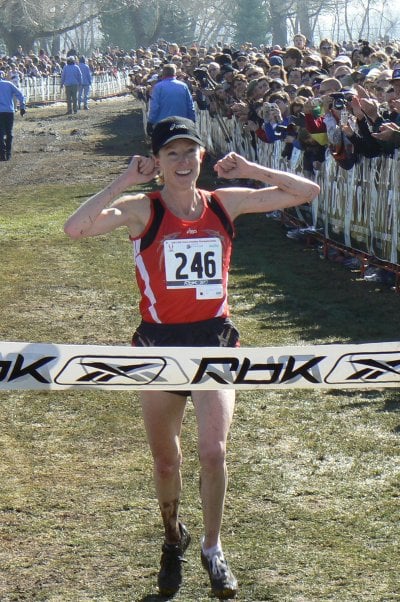It didn't happen. Culpepper, fully under control and surging toward to the tape, won Saturday's cross-country championships in Boulder, Colo. by completing the muddy and snowy 12k course in 37:09 to Goucher's 37:35 and Ritzenhein's 37:47. Interestingly, upon hearing the results by repeatedly refreshing hurriedly typed reports on a running message board, running geeks (like me) sounded a nationwide, "Wow! What a surprise… what got in to Culpepper?" Here's the thing about that – Culpepper, 34, has been to the Olympics twice in two different events, won two previous national cross-country titles, as well as a national title in the 5,000, 10,000 and marathon. In 2003 Culpepper ran a 2:09:41 at the Chicago Marathon and finished fifth in 2:11:02 after an aggressive effort at the 2006 Boston Marathon. Yet with those outstanding credentials Culpepper's victory on Saturday is an upset. Why? Was it the rough day he had at the New York City Marathon last November? Perhaps – after all, Culpepper had to drop out because he couldn't stay hydrated despite drinking throughout the race. Couple that with what I wrote about Culpepper before the New York City race and it's easy to understand why the running geeks (like me) believed Ritz, Goucher or Abdi Abdirahman were the runners to beat in the deep field. To wit: And of course I'd like to write that American Alan Culpepper is going to let it all hang loose and be risky instead of his typically intelligent tactics. Culpepper is always consistently steady, which produces great times but it isn't exactly inspiring. To steal a phrase from baseball players, Culpepper doesn't like to "get dirty." Culpepper got dirty, literally, on Saturday. Better yet, those so-called "intelligent" tactics served him well. In the end, when the race was on the line, Culpepper ran the two kids into another muddy ditch. There's definitely something inspiring about a tough race run well. More: Daily Camera (Boulder) running section Denver Post: "Boulder's 'Running Town' Reputation Safe" The results What happened? Abdi Abdirahman, my choice to win the race, finished 21st in 39:07. Hyped just right Meanwhile, the press covering the event in The Running Republic of Boulder gave the race rave reviews. The town, the event, the course and the fans all lived up to the pre-race hype, which is saying something. In this distance running Super Bowl only the finishing times seemed lopsided with an estimated 10,000 fans lining the course two-to-three people deep to watch a cross-country race. According to the dispatches from Boulder, New York City has a high hurdle to leap for November's marathon Olympic Trials. We'll definitely have to see that one first hand. DOMINATION On Saturday Deena Kastor proved that she is the best woman American runner ever. Yeah, she's even better than Joan Benoit Samuelson. Nevermind that Kastor owns three of the top four marathon times in U.S. history, or that Samuleson won the Olympic gold in 1984, the Sullivan Award in 1985, and at 50, Joanie can still run an Olympic Trials-qualifying time for the marathon, what Kastor did to the field on Saturday is ridiculous. Kastor won her eighth cross-country championship by covering the 8k course in 26:47. That's 61 seconds better than second-place finisher Shalane Flanagan, which is almost unheard of in a national championship race. A five-second victory is significant, but 61 seconds is more than domination if there is such a thing. Here's the crazy part. Just two weeks ago Flanagan set the American indoor record in the 3,000 meters, and actually led the race after two kilometers. But according to the race recap from Letsrun.com, Flanagan said, "I think it was a little naïve to think that I could run with her." From Letsrun.com: Kastor and Flanagan were well clear of the rest of the field not even 2k in, and in third was Kara Goucher who had a big gap over the rest of the field. Kastor however wasted no time in destroying the young upstart Flanagan. She pulled away from Flanagan and soon the lead was 10 seconds, 20 seconds, and then 30 seconds. Flanagan was not faltering, however, as she had 30 seconds up on the third place Goucher. Kastor was just putting on one of the most dominating performances in the history of American women's distance running. Deciphering the reports and the photos from last Saturday's big race in Boulder, Alan Culpepper sat back and allowed pre-race favorites Adam Goucher and Dathan Ritzenhein do all the hard work through the first 10 kilometers. It was then that the race went from Goucher trying to stick with the next great American distance hope Ritzenhein, to the former champ Goucher attempting to keep Culpepper from dominating that final two kilometers.
Deciphering the reports and the photos from last Saturday's big race in Boulder, Alan Culpepper sat back and allowed pre-race favorites Adam Goucher and Dathan Ritzenhein do all the hard work through the first 10 kilometers. It was then that the race went from Goucher trying to stick with the next great American distance hope Ritzenhein, to the former champ Goucher attempting to keep Culpepper from dominating that final two kilometers.
 While the men's national championship was an upset with the old man knocking off the young bucks, the women's race was a coronation. And it wasn't just a new thing, as in Deena Kastor is the best American runner of her era. Nope, that's not good enough.
While the men's national championship was an upset with the old man knocking off the young bucks, the women's race was a coronation. And it wasn't just a new thing, as in Deena Kastor is the best American runner of her era. Nope, that's not good enough.
More: Watch the races and check out the entire day in Boulder on Flocast

